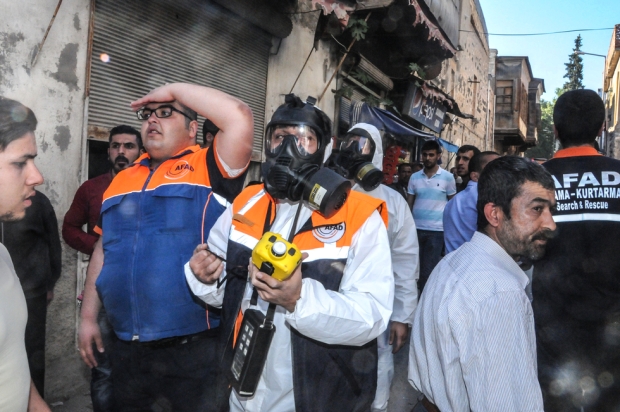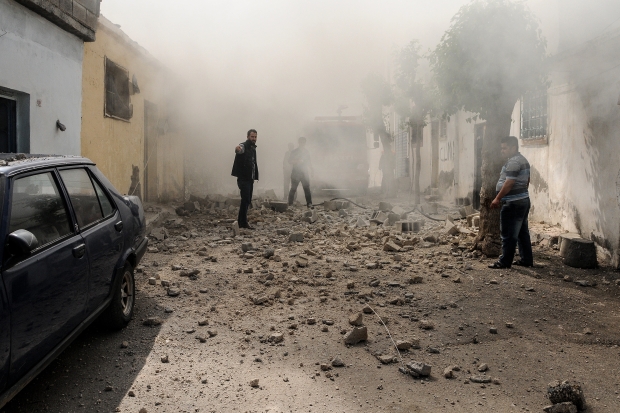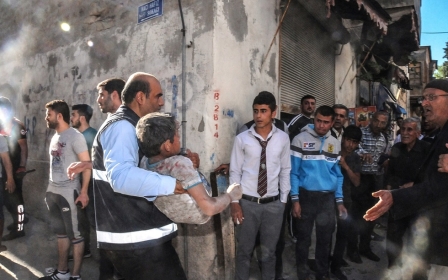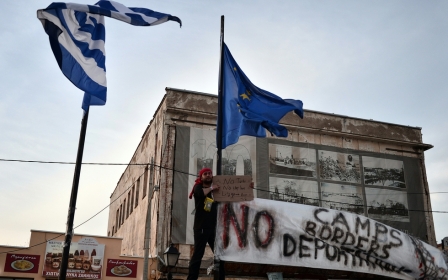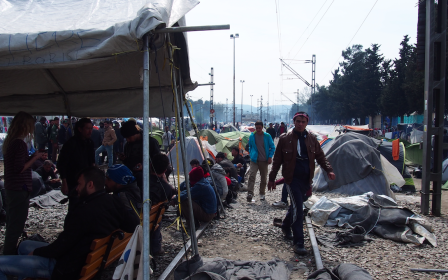Tensions grow between Turks and Syrians as rockets rain on Kilis
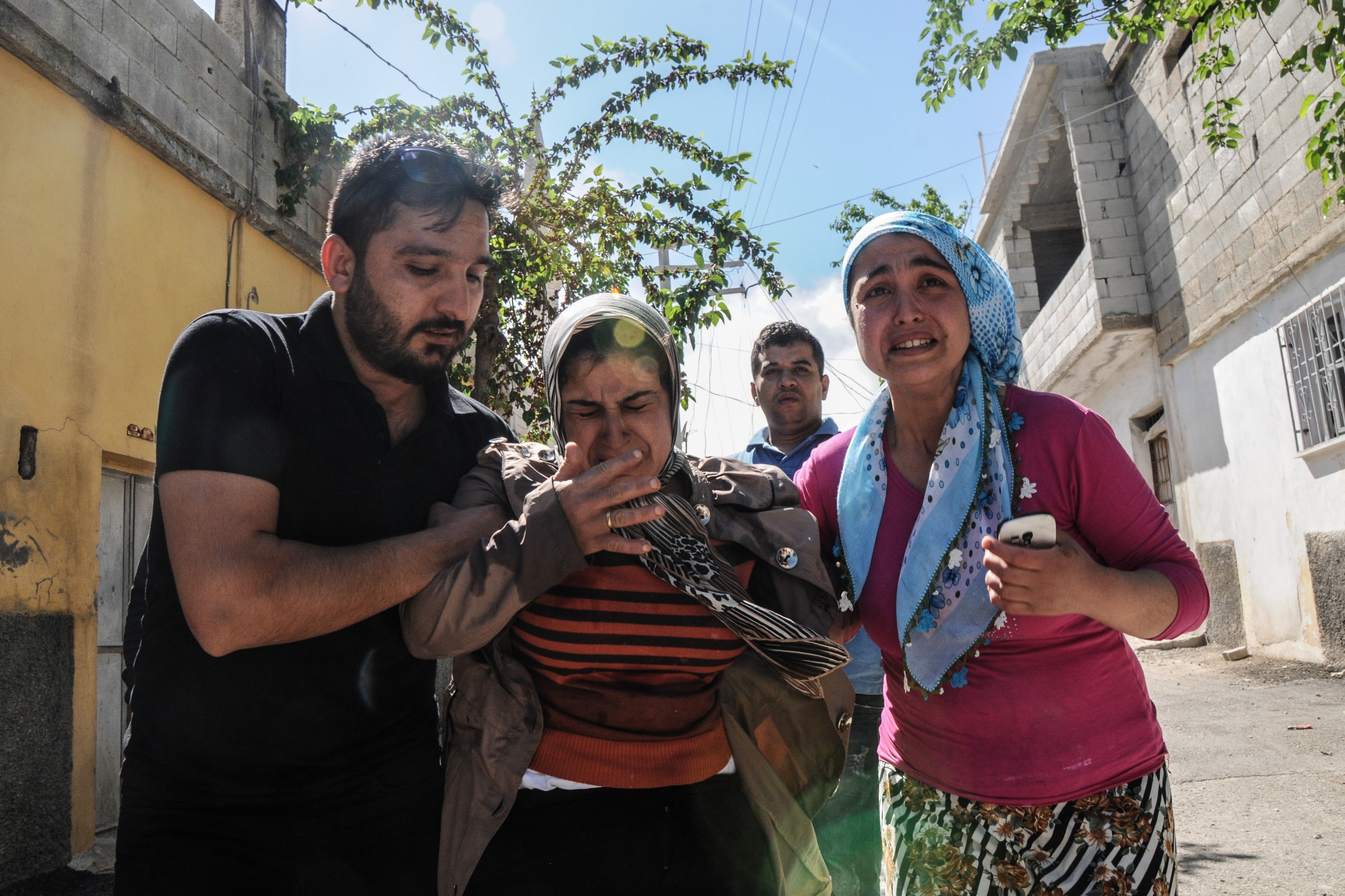
KILIS, Turkey - Tasnim, Yasmin and Mohammed were playing on the roof when the explosion ripped through their home in Kilis. The three Syrian siblings were all less than 15 years old, and had already outlived their father who had been killed in the war ravaging their homeland.
But in the apparent safety of Turkey, they stood little chance against the Katyusha rocket, which appears to have been fired by the Islamic State group from Syria, and tore through three floors of Summak Apartment No 5, in the narrow residential streets of the border town.
Maryam, the dead children’s mother, had been out at the time of the rocket strike on Monday and has since had to bury three more members of her family. Middle East Eye understands she has been moved to her parental home elsewhere in Kilis.
A former neighbour who saw the explosion told MEE that she was in the kitchen when the rocket hit.
“I could not see my own children through the dust. They were all crying. I pulled the children into my home and they were taken to hospital,” she said.
The first floor resident, who declined to give her name, said that her home had been destroyed, but that she feels blessed to have been spared the losses of her upstairs neighbours.
“They were a good family. I am new in Turkey but now I don’t feel safe,” she said.
Fatima, another refugee from Syria who saw the blast from her bright apartment across the road, said the whole neighbourhood was in shock.
“I was home when I heard the rocket blast through the building,” she said. “All the children started crying and screaming. The blast went straight through the building, and then the police came to take away the injured.
“We felt safe here before, but now with rockets like this how can our families feel safe? “
The children have been taken back to Azaz in northern Syria to be buried, according to Kilis locals. A fourth Syrian child who was playing with Tasnim, Yasmin and Mohammed when the rocket struck, has also since succumbed to his wounds and has been buried in a local cemetery. A handful of others were also injured but are believed to be out of danger.
The children were the latest victims in a string of rockets fired from IS-held territory in Syria to hit Kilis, the town on the border that has taken in 120,000 refugees that now outnumber the local population of some 80,000 Turks.
So far, at least 11 people have been killed in similar rocket attacks this year, which have forced Turkish authorities to deploy military reinforcements and prompted fire back into Syrian territory.
The destruction to the Syrian homes in Kilis, now locked up and watched by plain-clothed Turkish police, is fully visible from Fatima’s roof. A two-metre wide hole sears through the terrace of Maryam’s former apartment, surrounded by a tangle of satellite wires, the remaining shards of plastic chairs, and what was once a door leading to the lower floors of the house in which apartments were hosted and managed by a Syrian NGO.
“We escaped bombs in Syria, and now we feel they are following us here”, said Abdullah, 17, from the bakery next door to the building.
“Everything fell off the shelves and shook,” Abdullah said, recalling the moment the rocket struck at around 4.30pm local time (13.30 GMT). “This is nothing compared with the bombs in Syria. And we could leave to another town in Turkey. But there are bombs in Istanbul too. The bombs follow us everywhere.”
In recent months Turkey has seen an uptick in violence, with the Islamic State group targeting popular tourist sites and pro-Kurdish activists, and the Kurdish Workers Party (PKK) also launching a string of deadly attacks.
Habashi mosque in Kilis is another casualty of the fighting. The building was devastated by rocket fire that fell from Syria on Tuesday. No one was killed, but the mosque badly damaged.
The mosque’s caretaker, who gave his name as Hanifa, said he was in the lobby when the force of the rocket strike pushed him backwards, dislocating his shoulder and sending shards of glass tearing through his arms and chest.
“The rocket hit the roof and glass shattered everywhere with the force but because it was lunch time and the streets were empty, no one was killed, thanks be to God,” Hanifa said. “We are scared because we are close to Syria. Kilis has a lot of problems now. But we are patient – our government tells us we need to be patient.”
Growing resentment
The strikes on Kilis may lead to further scrutiny of the EU’s controversial refugee returns deal with Ankara, which sees Syrians arriving in Europe returned to Turkey. In exchange, Turkey will be handed almost $7bn in extra funding to help it cope with the crisis.
Camps around Kilis were supposed to be landmark sites for returnees but the consistent IS attacks on the town raise fears that it is not a safe place of return.
Angela Merkel, the German Chancellor, was due to visit Kilis to open a new camp for 12,000 refugees last weekend but the visit was cancelled over reported security fears. The German Chancellor is instead expected to arrive in Gaziantep this Saturday where she will “listen to the needs” of Syrians in Turkey.
Syrians interviewed in Kilis said that the rocket strikes had prompted an increase in resentment towards them, with attacks reported on businesses and locals protesting in front of the governor’s office.
As a sign of the growing tensions, Turkey closed its border to all but the most vulnerable refugees about a year ago. It now reserves entry for people in imminent danger and has instead promoted safe zones on the Syrian side of the border. However, as these have come under growing pressure from IS, criticism from human rights groups have upped their criticism and stepped up calls for the borders to be opened.
“The Turks have been good to us, but now we are being hit, and the blame is placed on us,” said Fatima, whose family fled Syria eight months ago after barrel bombs destroyed their home.
A former lawyer from Aleppo who spoke to MEE on the condition of anonymity said he saw his car attacked by a gang of 20 local youths when they recognized its Syrian number plates.
“It was during wider anti-Syrian protests last week,” he said. “I heard noises and saw a gang pummelling the roof of my car until it collapsed. I reported it to the police but I fixed the car myself.”
The man, who ran a successful firm employing three lawyers back in Aleppo, is now unemployed but is determined to stay in Kilis because of its proximity to Syria.
He said his Turkish neighbours apologised for the incident, blaming isolated behaviour of a gang of youths and that local authorities had spoken to the parents of young people involved in an attempt to ease tension.
“They [the Turkish people] say there are too many Syrians here. And I know, it is their country, and we are refugees in it. We have packed our stuff and are ready to move elsewhere. But for the moment we stay, because here, whenever I need Syrian air, I can climb Sheikh Mohammed mountain and breathe it.”
A Turkish teacher in Kilis, whose school was also hit by a rocket from IS territory in Syria in January, told MEE that there were too many refugees in the region now.
“Where will we go? What if the same happens at Reyhanli?” he said, referring to the border town in the Hatay region of Turkey. “My government is doing what it must do. I know the Syrians are fleeing great danger – [President Bashar al] Assad and the Islamic State [group] – and there is an old relationship between the Arabs and the Turks, but I support my country doing what it must do.”
There have been unconfirmed reports of local Turks leaving Kilis due to the number of refugees in the town. Dr Hakan Ozoglu, director of Middle Eastern Studies at the University of Central Florida, said reports and anecdotes from the area suggested that locals were “very nervous” and “had already started leaving”.
Government officials do not want to see a massive exodus of Turks, he said, especially as this may have “unknown and unexpected consequences” including prompting populations further along the border to do the same.
Back in Fatima's apartment, her children crawl chirpily across the floor and become fascinated by the sight of sunglasses.
"The Turkish have been good to us," she insists. "But the children's future is in Syria, not Kilis."
New MEE newsletter: Jerusalem Dispatch
Sign up to get the latest insights and analysis on Israel-Palestine, alongside Turkey Unpacked and other MEE newsletters
Middle East Eye delivers independent and unrivalled coverage and analysis of the Middle East, North Africa and beyond. To learn more about republishing this content and the associated fees, please fill out this form. More about MEE can be found here.


